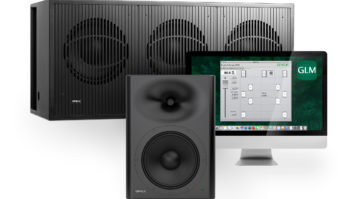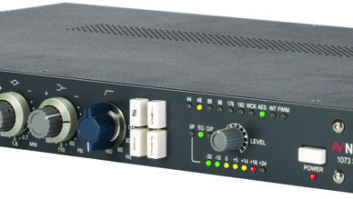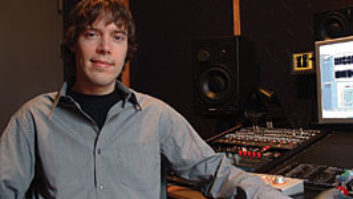Prior to becoming a mastering engineer and owning Magic Garden Mastering, Brian Lucey had been a writer, arranger, performer, mixer and tracking engineer. Once he tried his hand at mastering though, he was finally able to combine his many skills and talents and focus on doing what he does best. “I am a reluctant control freak,” Lucey candidly observes.

“I don’t like to admit it, but I really do a good job when I am left alone to do my own thing. When it comes to using my skills and taste, mastering is the best opportunity for me to exploit what I have to offer musically.”
Last May, Lucey moved his relatively compact Magic Garden Mastering operation into a new location in an 8,000-square-foot warehouse located just outside Columbus, OH. In the process, he was able to make substantial upgrades to the acoustics in his facility, which has helped his workflow become more efficient. “This room that I’ve been in for a little over a year is a better room than where I was before,” he says. “What I’ve found is that my work isn’t better than it was before; it just takes me less time to get it done.”
Even though Magic Garden Mastering is not one of the top brandname mastering facilities, Lucey has had no trouble at all attracting some seriously high-profile and commercially successful clients. In fact, on moving into his new space, his very first project was The Black Keys’ Brothers, which won a Grammy award for Best Alternative Music Album. He has also recently completed work on a new album by international pop sensation Sami Yusuf and is about to begin work on a new project by O.A.R.
Aside from his obvious skill and talent as a mastering engineer, Lucey sees at least two other key ingredients to the success of his work: his mastering chain and the physical evolution of his facility. “It’s well known and it’s true to say that you’re only as good as your room. Now I’ve got a room like everybody should have, which is wonderful,” he says. “The chain is also important, and I have a chain that took me about 10 years to get together,” he adds. “I’ve had my current chain for about five years.”
Lucey’s chain consists primarily of two EQs and a compressor. The first link consists of a heavily modified Focusrite Blue 315, which he says he bought because of its feature set and reputation. “The feature set was great, but I wanted to modify the sound,” he says. “I had Rob Harvey go through it, and we simplified the design and upgraded it to where it made me happy—I use this as a cut EQ and as a solid-state device.” The second link is an Elysia Alpha Class-A compressor/limiter, which he says also significantly shortens his signal path. “When I heard it, I thought it solved four boxes’ worth of problems,” Lucey recalls. “I’ve always been interested in a shorter signal path.” Finally, he relies on the Fairman TMEQ, a six-band, all-tube master equalizer. “This is a transformer in and out, with 22 tubes—11 per side, switched,” Lucey says. “They call it high-phase linear.”

Every December, Lucey tries substituting a different piece of gear in his chain, but has yet to improve on it. “I am interested in a timeless sound, and I think I have come up with a timeless chain,” he says. What attracts him to this particular chain? “There is a harmonic element that I am interested in,” he says. “I am also interested in full, intimate low mids, and a beautiful high mid and top shelf. I can do all of these things with what I have.”
Besides his chain, Lucey has continually relied on RealTraps acoustic treatment, both in his old facility and in his new. “I prefer to work in an intimate space, and conventional wisdom says that a large room is needed to deal with a host of predictable issues. RealTraps Modular Room Kits, including Diffusor Modules and Mondo Modules, solves the difficulties inherent in small rooms.” Acoustically, he says that Magic Garden Mastering now has a tighter image and sound, but that he has had to pay careful attention to bass trapping, via RealTraps MegaTraps. “The downfall of small rooms is always low end build-up,” Lucey observes.
For monitoring, Lucey relies on a pair of Sprial Groove Allegra loudspeakers, designed by Joachim Gerhard. “Gerhard uses a tweeter that I’ve never seen before that combines a soft dome with a titanium center so you get the low-distortion extension of the metal, without the nasty metal ringing that can be prevalent among metal dome tweeters,” Lucey says. “He also uses birch plywood instead of other stiffer, non-resonant materials.”
For Lucey, it was not a quick or easy process to find his own sound; it took patience, a lot of listening, and a lot of A/B-ing gear. “Every engineer has to find their own thing that makes them happy,” he says. “I had a very specific sound in mind that I was trying to get. I looked and looked for like 10 years until all these pieces fell into place. I eased into it with each piece that made sense.” His own intuition and experimentation also played a fundamental role in helping him find his way: “I’ve heard just about every piece of gear on the market, I’ve experimented extensively and I have A/B’d just about everything there is to hear.”
Moving forward, Lucey hopes that Magic Garden Mastering will continue serving both up-and-coming artists, as well as established, Grammy-winning ones. “My business plan is in two very different directions,” he continues. “One is to provide up-and-coming artists with the best mastering money can buy for a remarkable price, and the other is to continue attracting artists who are already reaching large masses of fans, like The Black Keys or O.A.R.”
Jeff Touzeau is a regular contributor to Pro Sound News. His most recent book is Sound Ideas for a Sound Planet: The Green Musicians Guide (Cengage).






